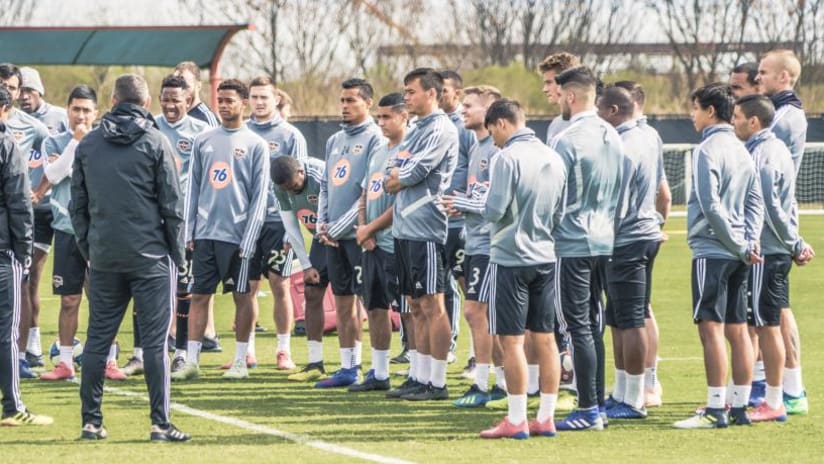The Houston Dynamo don’t have the star power, deep pockets or the same levels of recent success as the four other MLS teams preparing for the start of the Concacaf Champions League, but they do have the top-end talent to make some serious noise in the competition and in league action this year.
Alberth Elis is electric, Mauro Manotas is one of the top finishers in MLS, Juan David Cabezas is an underrated midfield general and Tomas Martinez and Romell Quioto can dazzle in the attack. As we saw in the club’s runs to the 2017 Western Conference Championship series and to the 2018 U.S. Open Cup title, the Dynamo are dangerous when they’re clicking.
Unlike fellow 2019 CCL participants Atlanta United, New York Red Bulls, Sporting Kansas City or Toronto FC, however, Houston, who had the lowest payroll in the league last season, have had little room for error over the last couple of years. They’re a handful when things are going smoothly, but they seemed like they were always one setback away from falling off the rails in 2017 and 2018.
Last season, that setback came in the form of an early injury to Cabezas. The 27-year-old suffered a quad injury 15 minutes into Houston’s opening game and, after returning to the field for one match in May, he re-aggravated the muscle and was out for the bulk of the rest of the season. The Dynamo missed him dearly. They recorded just 25 points in 28 games without the Colombian as they stumbled to a ninth-place finish in the Western Conference.
Even with the Open Cup title, the 2018 season was a significant disappointment following Houston’s promising 2017. To rebound this year while attempting to navigate their way through the CCL, the Dynamo had to make their margin for error a little bit bigger this offseason.
“We knew we needed to be aggressive,” GM Matt Jordan told MLSsoccer.com this week.
Upgrading at center back and finding an improved central midfield partner for Cabezas were their main priorities. Houston feel they achieved both by signing Slovenian international defender Aljaz “Kiki” Struna from Italian Serie B club Palermo and adding midfielder Matias Vera from Argentine side San Lorenzo. Both players were acquired using Targeted Allocation Money.
They also added to their two-deep with a number of MLS veterans, re-signing left back DaMarcus Beasley and bringing in right back Chris Duvall, midfielder Tommy McNamara, right winger/right back Marlon Hairston and defender Maynor Figueroa. None of the moves made big headlines, but they should give Houston a little extra wiggle room. The idea is that one or two absences won’t derail the club this season like Cabezas’ injury did in 2018.
“We put an increased focus heading into this season on building a roster where we have two players in every position who we feel can step in at any moment regardless of the competition and contribute to the success of the team,” said Jordan. “Especially with a demanding schedule, we know we’re going to rely on everyone. And we feel we’ve got a good group.”
Struna, 28, inked a four-year deal with Houston after spending the previous six years in Italy, primarily in Serie B. Vera is a more familiar type of signing for the Dynamo. The 23-year-old Argentine is relatively young, Latin American, not all that expensive and not particularly high-profile. That’s the general mold Manotas, Cabezas, Quioto, Elis and Martinez fit into when they arrived in Texas, though the latter two players were somewhat bigger commodities when they signed.
Targeting that specific type of player is intentional. Houston aren’t paying massive transfer fees for finished products or hotshot prospects. Historically, they’ve had to look a bit more toward the bargain bin, finding players on the cheap that are then developed by head coach Wilmer Cabrera and his staff.
“We wanted to build a roster that’s young, that’s dynamic, that has upside and has a capacity, a good capacity, for growth,” said Jordan. “For us, that has been really important. And it’s also important to have a coaching staff that’s passionate about teaching those players and helping them improve, so that’s been a really important part of our strategic plan.”
Elis and Manotas, both 23, are undoubtedly Houston’s two biggest success stories. Both arrived at the club without much high-level first-team experience, and both have turned into legitimate MLS stars. Elis recorded 11 goals and 10 assists in 30 games last season, giving him 21 goals and 14 helpers in 56 regular-season appearances in two seasons with Houston. Manotas followed his 10-goal, five-assist 2017 with an even bigger 2018, finishing tied for fourth in MLS with 19 goals in 33 matches.
With that success came suitors. Elis and Manotas both attracted interest from Europe this winter, with Elis engaging in a public will-he-or-won’t-he transfer saga with Turkish club Fenerbahce. Jordan didn’t get too specific when talking about either player’s European options, but he cited a desire to keep the core of the team intact ahead of Houston’s big 2019 as a reason for keeping both around. If both continue on their upward trajectory, Jordan acknowledged that the day will come when Houston will likely sell. For a club that hasn't spent much historically, maximizing the fees for both of their stars will be critical.
Hanging onto Elis and Manotas will certainly help Houston in the CCL, which they’ll begin next Tuesday with Leg 1 of their Round of 16 series against Guatemalan club Guastatoya. If they advance, Mexican giants Tigres or perennial Costa Rican contenders Saprissa will wait in the quarters. Saprissa would be a significant test and Tigres would be big favorites against the Dynamo.
If Houston are at 100 percent, however, they’ll have a fighting chance. And even if they don’t make a big run in CCL, the Dynamo feel their top-end talent and newfound balance will be enough to get them back in the mix in MLS in 2019.
“Last year the roster wasn’t balanced due to some injuries we dealt with with players like Juan,” said Jordan. “We feel moving into this season that we’ve changed that. We know we have a lot of hard work ahead of us, but we think we’re moving in a good direction.”











